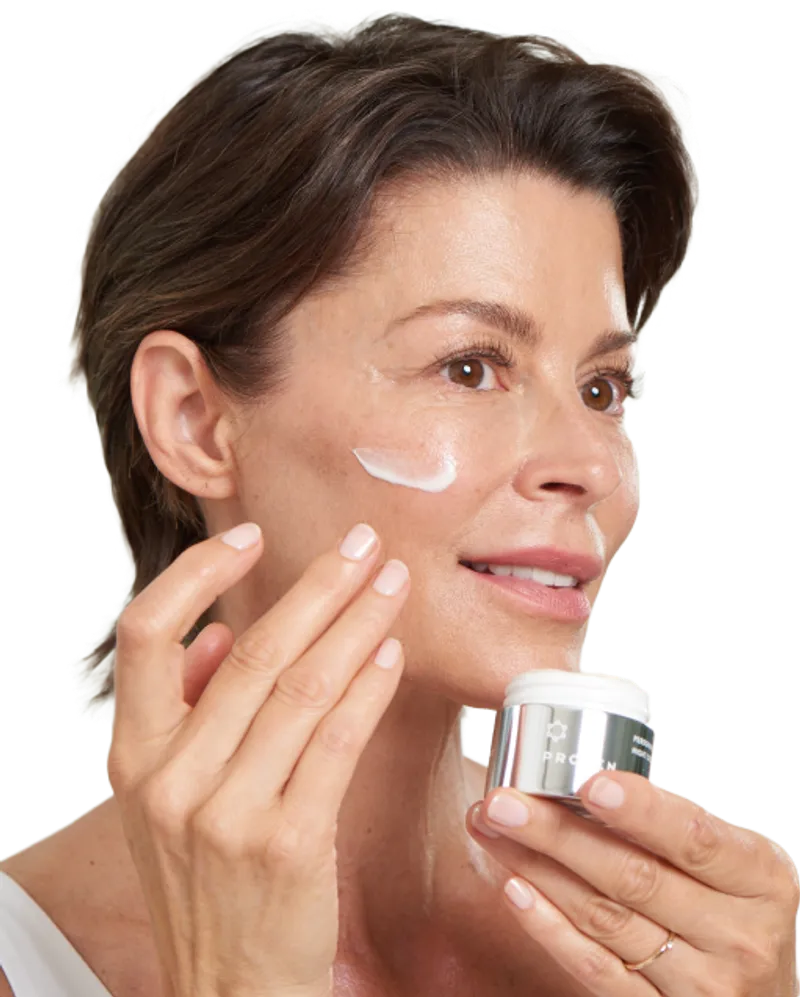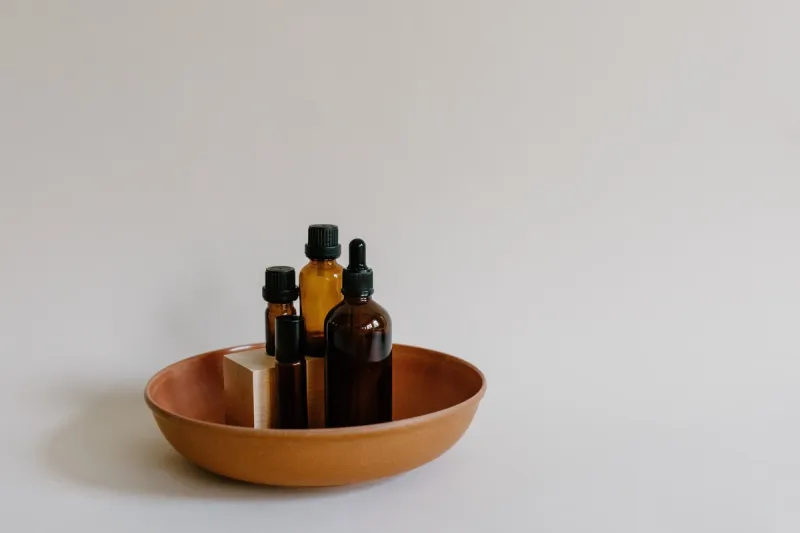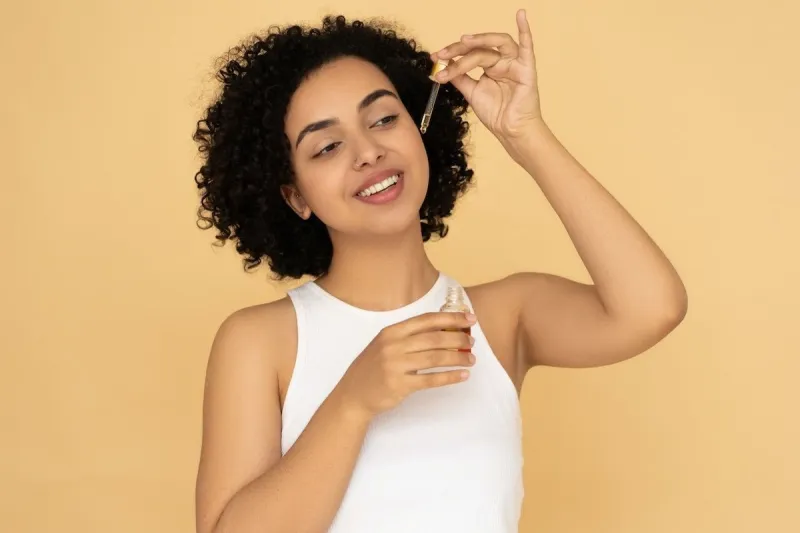Retinol has risen from what once seemed like an industry secret to a leading skincare ingredient. Today, dermatologists assert retinol and retinoids are the most effective anti-aging ingredients on the market. Estheticians recommend it. Even your baby sister raves about its skin-saving powers and refuses to travel without it.
Whether you’ve recently spotted your first wrinkle, noticed dark spots or have just decided to amp up your skin-supporting regimen; retinol has almost undoubtedly come across your radar.
But at what age should you weave it into your skincare routine—and is it ever “too late” to do so? Let’s see what the pros have to say.

Custom Luxury Skincare At An Affordable Price
Get the youthful, radiant skin you deserve with your own personalized anti-aging formula
What Age Should I Start Using Retinol?
The question of when to start using retinol is a vital one. At what age do we start getting wrinkles? The earlier you start taking preventative measures, the higher your chances of preserving your skin’s radiance and integrity.
For this reason—among others—experts agree that you should start using products containing retinol at around 25 years old.
However, see a board-certified dermatologist who can monitor your retinol use as retinol might not be right for everyone. It’s a great ingredient if your skin type can handle it.
Your 20s are a magical and transformative time, and this doesn’t just apply to your career and love life. While the first half of your 20s might still be affected by the skin woes you had as an adolescent (we see you, pimples), you’re still producing ample amounts of collagen—an essential protein that gives your skin its volume, elasticity, and plumpness.
We naturally manufacture a ton of collagen when we’re babies, kids, and teens. But in our mid-20s, our internal collagen factory eases up on production. As a result, the strength of our skin starts to waver and weaken. Eventually, this may lead to the hallmarks of skin aging, such as:
- Fine lines and wrinkles
- Loss of suppleness
- Sagging, crepey skin
- A “hollowing-out” look underneath our eyes and around our face
Fortunately, these signs of the years passing by are rarely accentuated in your mid-20s.
And if you take action post-haste, you may soften their appearance—immediately and in the future. This is precisely why experts suggest using a topical retinol product as soon as your body starts slowing down on the collagen-production front and starts showing signs of aging skin.
How Does Retinol Help Your Skin?
Retinol is an over-the-counter, milder form of tretinoin, a prescription derivative of vitamin A—the same nutrient we need for vision, immune, and reproductive health (among other reasons).
Vitamin A also plays a crucial role in the wellness of your skin. When it’s formulated into a topical retinol cream, serum, gel, or lotion, it has the potential to:
- Act as a natural exfoliator – As your first line of defense against the world, your skin encounters plenty that could damage it—from the sun’s UV rays to environmental pollutants. And every 30 days or so, your skin automatically sheds dead skin cells to greet a new batch. This built-in regeneration is awesome, but if these dead cells don’t shed entirely, you may see blocked pores, dryness, and patches of flaky skin. Exfoliators, including natural exfoliators like retinol, “scrub” off this layer to reveal the fresh, glowing skin underneath.
- Encourage collagen synthesis – Can you use retinol for wrinkles as an exfoliator? Exfoliation also stimulates collagen production. In turn, this helps decrease the appearance of fine lines and wrinkles and gives skin that lovely suppleness we’re all after. The increase in collagen also has the potential to diminish the look of enlarged pores.
- Soften the effects of photodamage – You can also potentially use retinol for dark spots. We’re all aware that excessive, unprotected exposure to the sun can wreak havoc on the condition of our skin. Retinol works towards repairing the signs of photoaging caused by sun damage, including reducing the appearance of hyperpigmentation like sun spots and improving uneven skin tone.
What if I’m Way Past My 20s?
The age of 25 might be the optimal time to begin using retinol, but it’s certainly never too late to start incorporating it into your skincare routine.
Collagen production continues to decline as we move past our 20s and into our 30s, 40s, 50s, 60s, and beyond. For this reason, every bit of a push to support your natural production helps, no matter how old you are.
More importantly, your numeric age is less important than you might think. The state of your skin is influenced not by how many candles you just blew out on your birthday cake but by your:
- Genetics
- Lifestyle factors, such as good habits like exercise and detrimental habits like smoking
- Skin type
- Amount of sun exposure
- Location
But retinol isn’t for everyone. It may have some side effects (like redness and irritation) you should be aware of before you make room for it on your bathroom shelf.
Who Shouldn’t Use Retinol?
Your skin is as unique as your personality, and favorite show on Hulu, and what works for your baby sister may not work for you—yes, even if you share the same genes.
Retinol should be avoided completely if you’re pregnant or breastfeeding. You should also consult with your dermatologist and/or use retinol with caution if you have:
- Dry or sensitive skin
- Acute acne
- Rosacea
- Skin conditions such as eczema
How Do I Use Retinol Safely?
Most people tolerate retinol well, but when you use it—and how—makes a world of difference. Here are some tips to guide you toward using this superstar ingredient with success:
- Start slowly – Retinol is a potent ingredient that may cause irritation, especially if you start with a skin care product that contains a high concentration and apply heaps of it to your face. We understand the temptation, but more isn’t always better—at least to start with. Begin with a concentration of 0.05% and apply it every two to three days. If your skin accepts it, you can gradually build up to a higher prescription. Your personalized PROVEN skincare set will automatically do this for you by adding in small amounts to your products over time.
- Apply retinol at night – Because retinol operates as an exfoliator, it delivers fresher skin—but it also makes your skin more sensitive to sunlight. Apply retinol at night and use sunscreen during the day.
- Prioritize moisturizer – Moisturizer is your skin’s best friend, with or without retinol, but it’s particularly critical when you’re using retinol products. A nourishing daily moisturizer with SPF can help keep irritation, flakiness, and dryness at bay—and give you that glow you covet.
Find Your Skincare Solutions with PROVEN
Retinol has garnered a sterling reputation, and deservedly so. With its ability to support cell turnover, it may be just the right product to include in your skincare toolbox—whether you’re 27, 47, or 67.
PROVEN Skincare can help you figure out the other specific ingredients you need to nourish your individual skin type and address your most pressing skin concerns. Start out with our quick but comprehensive skin concerns quiz, and we’ll give you a detailed explanation of the ingredients we’ve selected for your tailor-made skincare system.
Experience the difference personalized skincare can make at any age with PROVEN.









